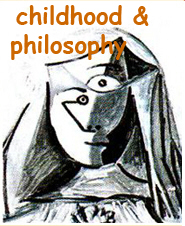parrêsia and subject constitution: democracy and education
Keywords:
Education, society, subjectivity, politicsAbstract
In this article, we will study the constitution of the subject as described by Foucault in L’Herméneutique du Sujet and we will try to establish the relation between this constitution and the political gesture that irrupts in the every day life, which sets the subjectivity in opposition with the actual culture or society — called Parrêsia in Le courage de la Vérité. The parrêsiastic act, which disrupts the social order by its subjectivity affirmation, is a risky act, which puts the subject in the limit situation of a self-affirmation that goes against what we may understand as a social or political act. It means the subject gets free of the local and cultural conditions to seek for a realization of the highest freedom of expression and action. The subject of such act, so, takes position as its own reference, and then acquires a character that reveals the issues of a civilisation and at the same time becomes the representative of an emancipated an free humanity. The democracy, understood in its most rigorous sense, in this perspective, depends on the possibility of the parrêsia, which effect is to open a dialogue between the society and the political subject. The importance of such phenomenon is really huge when we try to think about education and its social and political effects. The relation between education and democracy is the condition for us to have a true democracy, in which the citizen is included in the community in total freedom and aware of its participation to the common work. But, as suggests Foucault’s analysis, this political and social insertion, which is also a cultural insertion, that depends on education, doesn’t happens as a natural and linear process that would follow the simple fact of going to school or being present in the socially formed groups. On the contrary, it’s in rupture, in opposition, in the violent and irrevocable subjectivity’s affirmation, against what is generally admitted, that the subject erects itself upon the immediate situation to defend what it estimates as outside the range of established social rules and historical conditions. It’s this paradox, of a subject that realises itself against a society it belongs, but that, acting like this, opens the possibility to free its members from the weight of institutions that could be denatured or corrupted, in such way that can be constituted, founded upon this opening, a new social structure, more democratic and which respects more the nature of the humanity, that we want to indicate here and if possible understand better. If the parrêsia really has this character needed to the constitution of the democracy, how can we think about it in the domain of education? How can we conciliate the knowledge transmission, the learning of social rules and usages, whit the possibility of a free action, independent from the same rules? These questions will be raised, to open a discussion upon the relation between subjectivity, society and education.Downloads
Published
2013-01-08
How to Cite
quintiliano, aimberê. (2013). parrêsia and subject constitution: democracy and education. Childhood & Philosophy, 8(16), 379–404. Retrieved from https://www.e-publicacoes.uerj.br/childhood/article/view/20729
Issue
Section
articles




